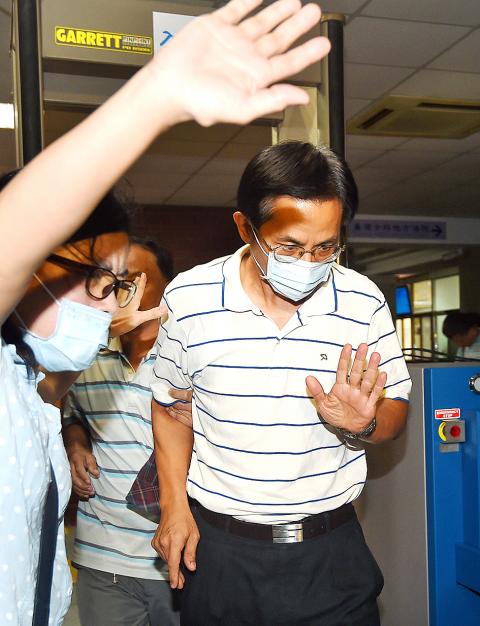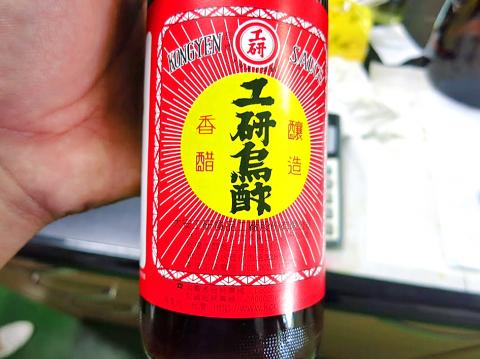Eleven vinegar and soybean paste products manufactured by Ta Chun Kong Yen Foods Co (大醇工研食品公司) were ordered to be recalled late on Thursday after the company was allegedly found to have reprocessed expired, defective and returned foodstuffs into new products.
A subsidiary and contract manufacturer of Ta An Kong Yen Foods Co (大安工研食品公司), the nation’s main vinegar manufacturer, which has been operating for 74 years, Ta Chun allegedly adulterated vinegar and soybean paste with expired and soon-to-be-expired products returned by wholesalers, the Shilin District Prosecutors’ Office said.
Prosecutors, along with Ministry of Health and Welfare inspectors, raided the company’s factory in Tamsui District (淡水), New Taipei City, and seized about 311kg of expired and unlabeled products late on Thursday night.

Photo: Liao Chen-huei, Taipei Times
Prosecutors said that they ordered the recall of nine vinegar products and two soybean paste products immediately after the raid.
Ta Chun director Hsu Chin-chun (許金春) was released on NT$5 million (US$152,858) bail after being questioned, while four other company officials were also questioned and posted bail, prosecutors said, adding that they could face fraud charges.
Prosecutors said they had conducted a secret investigation last month after they were informed by former Ta Chun employees in June of the company’s alleged illegal practices.

Photo courtesy of the New Taipei City Public Health Department
Hsu was quoted by her lawyer, Wang Kuei-shu (王桂樹), as saying that she denied any accusation of fraud, but the company “forgot” to tell consumers that its products were made with recycled and reprocessed products, for which the company was at fault.
Stressing that Ta Chun has strictly followed traditional methods when making vinegar and soybean paste, Wang said that the company reprocessed expired products between January last year and June this year, adding that “the longer the vinegar is stored, the more fragrant it is.”
Ta An director Hsu Chia-hsu (許嘉旭), the brother of Hsu Chin-chun, had no knowledge about the management of Ta Chun and the two companies operate independently, Wang said.
The Food and Drug Administration said that all foodstuffs must be labeled with an expiration date and it is illegal to use or sell any expired products and ingredients according to the Act Governing Food Safety and Sanitation (食品安全衛生管理法).
Violators are subject to a fine of between NT$60,000 and NT$200 million, as well as the suspension or withdrawal of their operating license, the administration said.
The administration said all the suspected problematic products must be removed from shelves by midnight on Sunday and violators could face a maximum fine of NT$3 million, according to the act.
In response, Ta An said yesterday that all its products had passed government inspections and examinations by a third-party facility with no reported irregularities and that prosecutors have not produced any evidence that Ta Chun’s products were problematic.
Ta An said it would nevertheless comply with the order to recall the products.
Executive Yuan Food Safety Office Director Kang Jaw-jou (康照洲) said that the case was a violation by a single manufacturer rather than a large-scale food safety issue, adding that although it is possible the reprocessed foodstuffs contain no toxic substances, such practices are untruthful and fraudulent.

MAKING WAVES: China’s maritime militia could become a nontraditional threat in war, clogging up shipping lanes to prevent US or Japanese intervention, a report said About 1,900 Chinese ships flying flags of convenience and fishing vessels that participated in China’s military exercises around Taiwan last month and in January last year have been listed for monitoring, Coast Guard Administration (CGA) Deputy Director-General Hsieh Ching-chin (謝慶欽) said yesterday. Following amendments to the Commercial Port Act (商港法) and the Law of Ships (船舶法) last month, the CGA can designate possible berthing areas or deny ports of call for vessels suspected of loitering around areas where undersea cables can be accessed, Oceans Affairs Council Minister Kuan Bi-ling (管碧玲) said. The list of suspected ships, originally 300, had risen to about

DAREDEVIL: Honnold said it had always been a dream of his to climb Taipei 101, while a Netflix producer said the skyscraper was ‘a real icon of this country’ US climber Alex Honnold yesterday took on Taiwan’s tallest building, becoming the first person to scale Taipei 101 without a rope, harness or safety net. Hundreds of spectators gathered at the base of the 101-story skyscraper to watch Honnold, 40, embark on his daredevil feat, which was also broadcast live on Netflix. Dressed in a red T-shirt and yellow custom-made climbing shoes, Honnold swiftly moved up the southeast face of the glass and steel building. At one point, he stepped onto a platform midway up to wave down at fans and onlookers who were taking photos. People watching from inside

Japan’s strategic alliance with the US would collapse if Tokyo were to turn away from a conflict in Taiwan, Japanese Prime Minister Sanae Takaichi said yesterday, but distanced herself from previous comments that suggested a possible military response in such an event. Takaichi expressed her latest views on a nationally broadcast TV program late on Monday, where an opposition party leader criticized her for igniting tensions with China with the earlier remarks. Ties between Japan and China have sunk to the worst level in years after Takaichi said in November that a hypothetical Chinese attack on Taiwan could bring about a Japanese

The WHO ignored early COVID-19 warnings from Taiwan, US Deputy Secretary of Health and Human Services Jim O’Neill said on Friday, as part of justification for Washington withdrawing from the global health body. US Secretary of State Marco Rubio on Thursday said that the US was pulling out of the UN agency, as it failed to fulfill its responsibilities during the COVID-19 pandemic. The WHO “ignored early COVID warnings from Taiwan in 2019 by pretending Taiwan did not exist, O’Neill wrote on X on Friday, Taiwan time. “It ignored rigorous science and promoted lockdowns.” The US will “continue international coordination on infectious